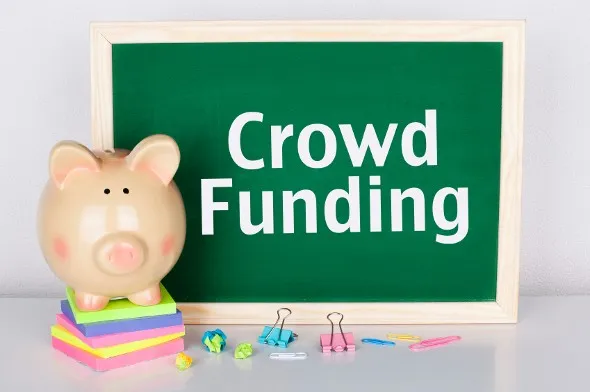Crowdfunding has shaken up the way people borrow and lend money. Aside from impacting the banking industry, the crowdfunding effect is also touching real estate. It’s now possible to invest in real estate through crowdfunding platforms or even raise enough money to cover the purchase of a home, though you’ll likely have to settle for just crowdfunding the downpayment because of legal rules. There are some things that you should be aware of, however, before deciding to move forward with using crowdfunding for your next home downpayment. Whenever making a large financial decision such as buying a house it can be a good idea to work with a financial advisor who can help build your wealth while helping you create the right financial plan for you.
Crowdfunding Your Mortgage
While crowdfunding a home mortgage downpayment sounds like a pretty sweet alternative to coming up with the money, there are some potential downsides. It’s important to understand the difficulty level of getting the money as well as what receiving the money this way could mean for your taxes. If you’re thinking that crowdfunding your way to homeownership is the way to go, here’s what to consider before launching your campaign.
1. Crowdfunding Can Be a Tough Sell
When you set up a crowdfunding campaign, you have to make a strong case for why people should hand over their money to you. There needs to be a compelling story that demonstrates why you’re a good candidate to have your down payment or mortgage crowdfunded in the first place.
If you’re asking for money just because you don’t want to have the burden of coming up with a downpayment for your mortgage, you may have a hard time getting support for your cause. The most successful crowdfunding campaigns either have a product people want or a compelling story that drives action. If you don’t have either of those then crowdfunding successfully might be a long shot.
2. Crowdfunding Is Still Subject to Gift Guidelines

Banks have rules about financial gifts when you’re buying a home and you need to make sure you’re following them if you’re trying to crowdfund your down payment costs. Generally, gifts have to come from someone who is close to you, such as a family member. Whether gifts made through a crowdfunding platform would be an acceptable source of funding will depend on your lender.
Assuming that the lender gives you the green light, you still need to have documentation for these gifts. This documentation typically takes the form of a letter. You may also need a copy of the gifter’s bank statement to show when the gift was made. If you’re getting lots of small donations from a large group of people, getting letters from each one might not be possible, so it’s important to keep accurate records every time someone contributes to your campaign.
If you’ve got a long lead time before you’re ready to buy a house, your best bet is to transfer any crowdfunded donations into a separate bank account and let it sit for a couple of months. Once the money’s been in your account for an extended period of time (say, 60 days or so), the funds would be considered seasoned. That means you wouldn’t need to provide any documentation explaining where the money came from if you wanted to apply it to your home purchase.
3. Crowdfunding Isn’t Free
Crowdfunding platforms are a business just like anything else, no matter how philanthropic they may seem. While anyone can start a campaign on one of these sites, you’re most likely going to have to pay a fee to do it. If the fee is high, it can eat into the money that you’re trying to raise for your down payment.
Kickstarter, for example, charges a flat 5% on top of whatever money you raise for hosting your campaign. Plus, you’ll pay another 3% to 5% for processing the payments that are received. The only way the fees don’t apply is if you’re not successful in reaching your funding goal. If you’re trying to raise a big chunk of money, it’s a good idea to account for these fees when you’re setting your goal.
Best Alternative to Crowdfunding

Some crowdfunding campaigns are extremely successful when it comes to getting funding, but others aren’t always so lucky. If your campaign falls short, then you’ll still need a loan to cover the gap. Making sure your credit’s in great shape, paying down your debts and building up your savings through other avenues can put you in the best position to qualify for a mortgage if you end up needing one.
While a crowdfunding campaign might work the best route to take is to probably go through the normal savings process with your finances. Create a budget and then put together a financial plan to help you achieve your goals. You can also work with a financial advisor to help you carve out the right path in order to help you achieve your long-term financial goals.
The Bottom Line
Crowdfunding has become a good way to raise money for a large purchase, which is why many people think they can potentially crowdfund their next home downpayment. It can be difficult to crowdfund your mortgage without a compelling story. This is what generally entices people to donate or lend money in the crowdfunding space. It has become much. more difficult to crowdfund routine or normal financial expenses since it was first introduced several years ago.
Tips for Buying a Home
- Talk to a financial advisor about how buying a home will factor into your larger financial plan. You want to ensure you can purchase a home without sacrificing your other financial goals, and a financial advisor can help create the right plan to do that. Finding the right financial advisor doesn’t have to be hard. SmartAsset’s free tool matches you with up to three vetted financial advisors who serve your area, and you can interview your advisor matches at no cost to decide which one is right for you. If you’re ready to find an advisor who can help you achieve your financial goals, get started now.
- Make sure your credit score is in good shape. With a high credit score, you can get lower mortgage rates, which translates to lower monthly mortgage payments.
Photo credit: ©iStock.com/Kritchanut, ©iStock.com/Oko_SwanOmurphy, ©iStock.com/RuslanDashinsky
